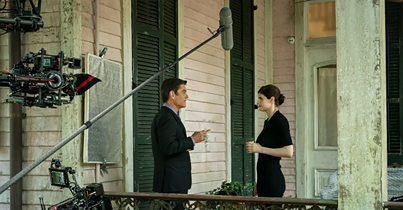Action!
New Orleans has always been popular as a location choice for movies and TV because it's hard to replicate our magic on a soundstage. Our film business has been exponentially expanding over the last 20 years.
We are currently the fourth largest filming destination in the country, and our record is 27 major projects shooting at once. We've had some ups and downs with catastrophes including named storms and temporarily losing our tax credit incentive legislation, but, most recently, our film community (and the thousands of jobs it protects) faced a new challenge with the back-to-back strikes from both the writers (WGA) and actors (SAG-AFTRA) unions.

Going into the details of the strikes would be a lot, but the bullet points are that actors and writers were fighting for:
-better wages
-higher residuals from straight-to-streaming platforms
-to protect their intellectual property and faces against AI duplication
-among other things
These strikes lasted roughly seven months and brought work to a grinding halt in that time.
The Price of Strikes
Our crews, for whom this is a lifestyle and not a job, suddenly and without warning found themselves adjusting from working 75+ hour weeks with steady paychecks to scrambling to wrangle gig economy work. Gina Granger Guirreri, a production office coordinator, found herself, like many others, driving for DoorDash and Uber Eats, making resin art, and becoming creative in trading Zumba lessons for her kid's daycare. Mike Nami, a rigging grip, started a handyman company, Nami Does It. Our extremely skilled and unionized workers suddenly were becoming trivia hosts, babysitters, bartenders, and bartering their skills. Workers who had very lucrative careers where they were the breadwinners for entire families were suddenly having to ask their families for handouts.
Many individuals who work in film have also established their own LLCs, such as Stephen Noell, a prop master who has a props business called Noell, LLC. Film is such a unique and fast-paced industry (often needing multiple options to appear in minutes) that many have started their own businesses to keep their gear in stock locally. This benefits them during the year with extra revenue and quicker sourcing but became a double whammy for many because they lost their job, as well as their business income, yet still had to pay for expensive warehouses.

In this industry, during this time, everyone wanted their story heard. They wanted the public to know what they had gone through this past year. Most importantly, they wanted to be assured they would have future work. Many of them didn't have a single prospect lined up and were panicking, with veterans stating they hadn't seen it this bad in their 30 year careers.
Hopeful Future
Although this seems bleak on top of an already dark year, there's light at the end of the tunnel, according to Simonette Berry, business agent for IATSE Local 478, one of the largest unions in the area representing film crews. She says the reasons for the slow trickle "back-in" to work for projects are numerous. For starters, all of the projects want to come back at once, so they're having to negotiate harder for the actors they need, with all projects vying for the same talent and all of them on a limited budget after hemorrhaging funds during the strike. Additionally, it was April and May when shows stopped shooting unexpectedly and without a plan, so matching our dreary winter exteriors to spring trees and flowers from earlier shot footage is proving difficult. Shooting during Mardi Gras can also provide additional challenges.
Berry says we have many shows shooting now or planning to film in the next couple of weeks and months, including reshoots for Carry On, Faces of Death, and new seasons for Mayfair Witches, Leverage Redemption, and The Corps/Pink Marine, among others, with many huge features currently "shopping" to take their projects here. According to a separate source, Spinal Tap 2 will also be making its way to the Big Easy soon, a project that's been in the works for quite some time.

Berry wants to remind studios that we have trained crews that live in New Orleans, over 15 deep and counting, and all of those people are ready to go back to work. IATSE 478 has 1,900 members, and there are additional members in IATSE 161 (Production Office), 798 (Hair and Makeup), 600 (Camera), and the Teamsters (Drivers) unions all ready to go back as well. This doesn't even count non-union covered crafts like production assistants or background actors, for example. The impact is felt not only in lost wages but also in terms of how our local businesses are supported, with film projects spending astronomical amounts on meals and supplies locally (over 1 billion has been spent in the state).
If you'd like to help, there are a few things you can do. For starters, look for the Louisiana Entertainment logo at the end of your favorite projects and make sure to visit theaters or stream these shows legally. If you'd like to donate, you can donate to the Entertainment Community Fund, which was instrumental in helping support crew members during the strikes. You can also share FilmLouisiana.com on your social media to get the word out that we have five-year tax incentives renewed through 2031 (and the five years are still good even if the project starts filming in 2030), as well as to see figures of just how much film impacts our community. If you need something sewed, wired, built, baked, or constructed, please consider going to a group or page such as Behind the Scenes LLC on Facebook to find film brothers and sisters who are still out of work and looking to use their exceptional talents to earn income. The bottom line of the script is, we cannot wait to go back to set and get the ball "rolling."

